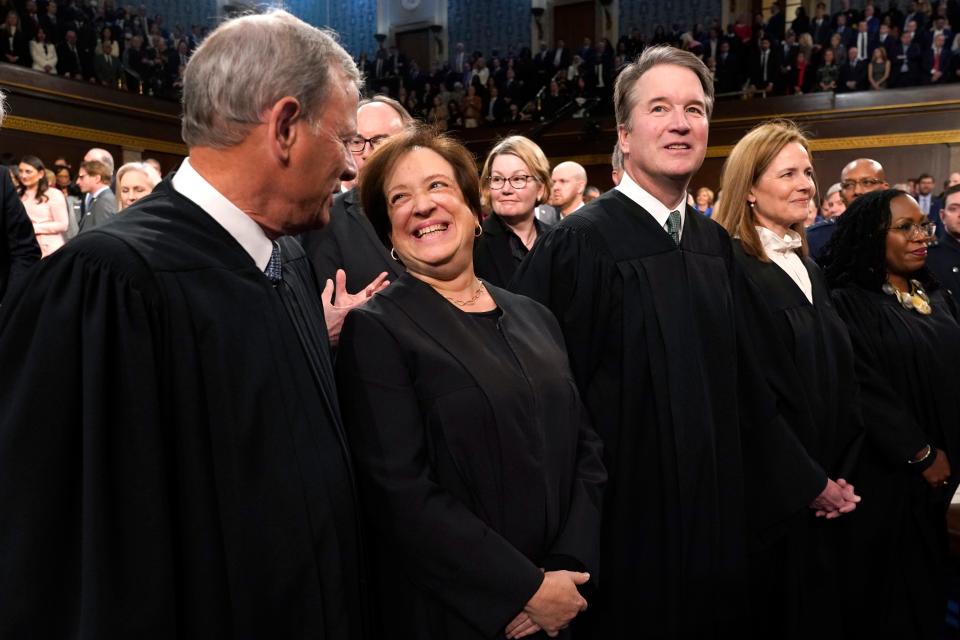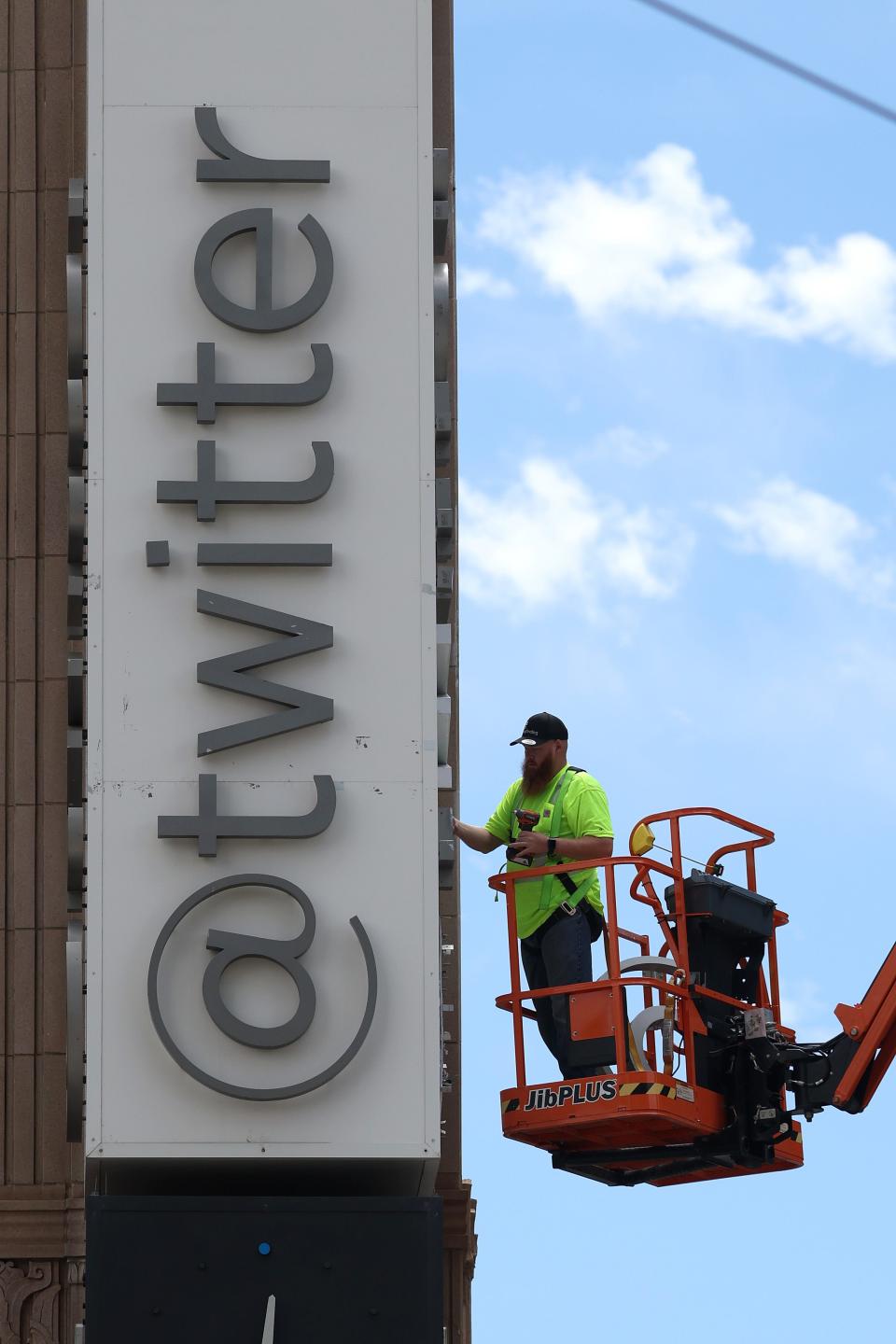Gun rights. Herring fishermen. An ethics hangover. The Supreme Court gets back to work.
- Oops!Something went wrong.Please try again later.
- Oops!Something went wrong.Please try again later.
WASHINGTON − The Supreme Court kicks off a nine-month term Monday that will thrust the justices into partisan quagmires over guns, social media and the Biden administration's power to make decisions without Congress.
But as the justices step into the ornate courtroom to hear oral arguments for the first time in months, they'll be confronting more than the usual docket full of controversies: They'll also be wrestling with persistent questions about ethics and foreign travel that polls show have undermined Americans' faith in the institution.
Less than half of Americans say they have confidence in the Supreme Court, according to a Gallup poll Friday.
Purdue: These two moms lost sons to opioids. Now they’re on opposite sides at the Supreme Court.
"I hope we can make progress," Justice Elena Kagan said during a recent speech at Notre Dame Law School, adding that she thought it would be "a good thing" if the justices agreed to adopt a code of conduct. "It would, I think, go far in persuading other people that we were adhering to the highest standards of conduct."
Fierce ethics debate looms in the background
Ethics won't come up in court or in opinions, but the issue could nevertheless hover over much of the term.
The Supreme Court has long faced questions over how justices police themselves off the bench. But a series of reports by ProPublica this year documenting lavish travel Justice Clarence Thomas accepted from GOP donor Harlan Crow added fuel to the debate and sparked an effort by Democrats to impose a code of ethics on the court.
Ethics: Not just Clarence Thomas: Lower courts facing scrutiny over ethics, disclosures, too
Four justices have spoken or written publicly about ethics in recent months, with three − Kagan, Chief Justice John Roberts and Justice Brett Kavanaugh − indicating that talks are underway about how to address the issue. Those remarks have been made as left-leaning outside groups and Democratic politicians have called on Thomas and Justice Samuel Alito to recuse themselves from taking part in several high-profile cases this term.
"The justices don't seem very interested in policing themselves in any serious way," University of Chicago Law School Professor Geoffrey Stone said recently during a panel discussion about the upcoming term. "I don't think there's any principled reason why the justices on the Supreme Court should not be held to the same types of regulations as other federal judges."
Related: Credit card? Auto loan? How the Supreme Court CFPB case could add 'chaos' to economy

Gun case puts court's conservatives in a jam
One of the more compelling cases on deck this year questions whether Americans who are subject to domestic violence restraining orders can be barred from owning guns under the Second Amendment. If the court decides the answer to that question is "yes," then the 6-3 conservative majority will have to find some way to square that with a landmark opinion it handed down just last year that undermined many gun regulations.
In an opinion invalidating a New York gun licensing law, a majority of the court ruled last year that gun regulations must be "consistent with this nation's historical tradition of firearm regulation" to survive court challenges. A federal appeals court in New Orleans said this year that the law prohibiting gun ownership for people who are the subject of a restraining order is an "outlier that our ancestors would never have accepted."
Put another way, the case is an opportunity for the court to clarify how its new Second Amendment theory should work in practice.
Later this month, the court may decide whether to hear an appeal over the Trump administration's ban on bump stocks, a device that uses the kickback of a semi-automatic firearm to mimic automatic firing. The owner of a Texas gun shop filed the lawsuit in 2019 after the Bureau of Alcohol, Tobacco, Firearms and Explosives banned the devices.

Herring fishermen hope to reel in government power
The court is juggling three cases that could severely limit the power of federal agencies.
The first was filed by four East Coast fishing businesses who object to a federal rule requiring them to pay for monitors on their boat to record their catches. It's not clear whether the law allows the Commerce Department to impose that requirement. And the herring fishermen essentially argue that if Congress wasn't clear when it passed the law, then the government is out of luck.
If the Supreme Court embraces that argument, it could have sweeping implications for federal agencies by limiting their ability to regulate the environment, guns and health care.
Another case, up for oral argument Tuesday, challenges the funding for the Consumer Financial Protection Bureau. A ruling against the government could undermine other independent agencies, such as the Federal Reserve. A third appeal challenges the constitutionality of in-house judges at the Securities and Exchange Commission, which decide cases involving securities fraud that used to be handled by the judicial branch.
Can Ron DeSantis tell Facebook which posts to keep?
The nation's highest court is jumping into a deeply partisan fight over social media this term that could change the way Americans − and American politicians − interact on platforms such as Facebook, YouTube and X.
On Friday, the court took up a pair of challenges to laws in Texas and Florida that would limit the ability of social media platforms to moderate content. Those laws were approved by the conservative states in response to allegations by former President Donald Trump and others that social media was throttling conservative viewpoints.
Several experts predict the states will lose, particularly in light of a decision last year by the Supreme Court in 303 Creative v. Elenis. In that case, the court ruled that the government could not compel a Colorado designer to make wedding websites for same-sex couples.
Social media: How the Supreme Court could alter the way Americans interact on the internet
"After 303, I don't know how the Texas and Florida people even have an argument," Lisa Blatt, a veteran Supreme Court attorney, said during a recent panel hosted by Georgetown Law. "Unless you believe that YouTube or Facebook are somehow the government, it's just a blatant First Amendment violation."
The Supreme Court will also hear oral arguments Oct. 31 in a pair of cases dealing with whether elected officials may block voters on the sites. A similar case involving Trump made its way to the Supreme Court in 2020 but was dismissed after he left office months later.

Is that all there is? Abortion could make a return
The Supreme Court is starting its term, but it hasn't yet fully defined it.
Several major cases are moving their way through the docket and could be granted later this year. Among the most closely watched on that list: The months-long legal battle over the abortion pill mifepristone. The justices could decided whether federal courts in Texas went too far by limiting access to the drug this year.
The court could also decide later this year whether to hear arguments in the case of a prominent Virginia high school that changed its admissions policy to accept 1.5% of the eighth-grade class at each of the district’s middle schools. Though the policy was race neutral it had the effect of increasing Black and Hispanic enrollment. A group of parents have sued, alleging the policy violates the 14th Amendment.
If added to the lineup, it would likely be decided a year after the Supreme Court ended the use of affirmative action in college admissions.
This article originally appeared on USA TODAY: Supreme Court returns to work with guns, social media, ethics on deck

